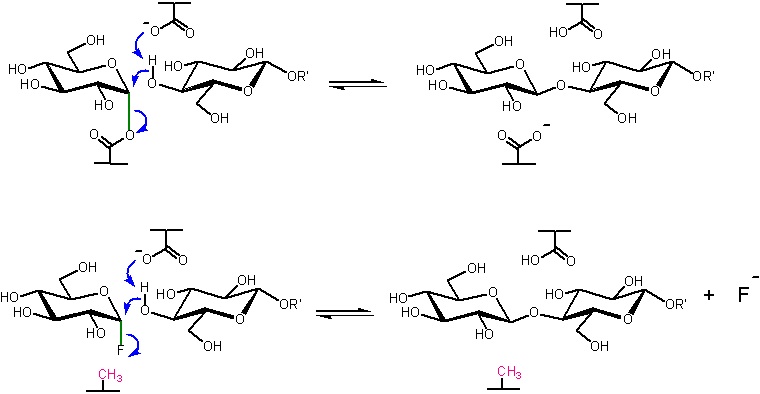Engineering of Glycosidases for Glycoside Synthesis – Glycosynthases and Thioglycoligases
We developed glycosynthases as mutant retaining glycosidases (modified catalytic nucleophiles) that carry out synthesis in essentially stoicheometric yield using a “mutant” glycosyl fluoride donor that mimics the reaction intermediate (see mechanism below: TOP – Wild-type transglycosylation; BOTTOM – Glycosynthase transglycosylation).
This approach has been applied to a range of enzymes by us and others. Recent efforts have focused on the improvement of rates (>1000 fold!!) by directed evolution. This work has been funded by NEOSE Technologies Inc., PENCE, CIHR and NSERC.
Thioglycoligases are mutant retaining glycosidases (acid/base removed) that synthesize sulfur-linked thioglycosides via the mechanism shown:
Random mutagenesis has again proved useful in enhancing rates. (Hannes Muellengger, Mark Vaughan, Young-Wan Kim, Karena Thieme, Amir Aharoni, David Zechel, Michael Jahn, Christoph Mayer, Emily Ng, Susan Hancock, Guangyu Yang, Lars Baumann, Ching-Ching Yu, David Kwan)
Activity-Based Proteomics and Enzyme Purification
Mechanism-based inactivators of endo-glycosidases with fluorescent biotin tags are being employed as probes of enzyme activity levels “in vivo” and have proved useful in the identification of novel enzymes in the C. fimi secreted proteome as well as in quantification of active enzymes in complex mixtures. (Omid Hekmat, Freya Chan, Kah-Yee Li, Jamie Rich, Tina Rasmussen, Mirko Zierke) The work has been funded by NSERC and the biofuels industry.
Metagenomic Discovery of New Enzymes
Metagenomic approaches allow the cloning, sequencing and characterization of the massive numbers of enzymes encoded within environmental bacteria that cannot be cultured – probably more than 95% of all bacteria. Enzyme discovery uses the same high-throughput screens used for directed evolution. In conjunction with Steve Hallam (Microbiology and Immunology, UBC) we are developing large libraries of novel glycosidases and discovering useful novel activities. (Kevin Mehr, Zach Armstrong, Spence MacDonald, Feng Liu, Tanya Duo, Hongming Chen) The work is funded by Genome Canada and Genome BC.

